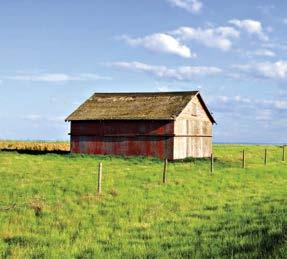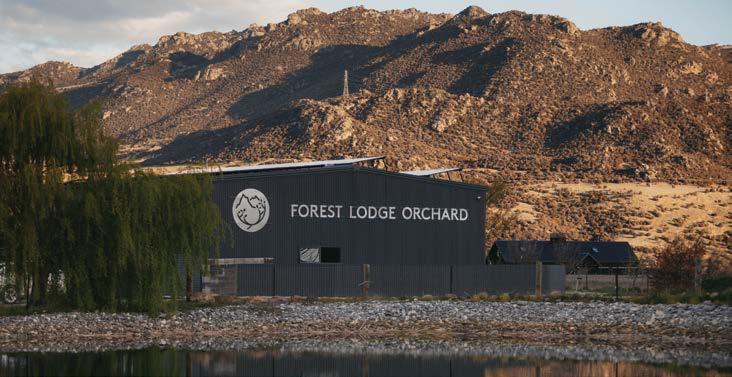
4 minute read
World’s first zero fossil fuel
Forest Lodge Orchard is believed to be the world’s first zero fossil fuel orchard operation
World’s first zero fossil fuel orchard
Mike Casey, owner of the world’s first zero fossil fuel orchard in Central Otago, shared his pioneering journey to fully electrify his six-hectare orchard at the New Zealand Agricultural Show in Christchurch on 10 November.
Gina McKenzie Photography: Thomas Green
Forest Lodge Orchard’s entire commercial operation – from electric frost fighting fans to irrigations, tools and vehicles – is powered by electricity and from power generated and stored on farm using solar energy and batteries.
Mike has ordered an electric tractor – a New Zealand first – which will arrive from the United States in 2023. In the meantime, he is trialling an existing tractor converted to an electric system. He says it is important not to let perfection be the enemy when it comes to making changes on orchard. “We need to start by looking at the choices we make for things we can control like the equipment we use on our farms,” Mike says. “I have gone ahead and done everything I can do to eliminate reliance on fossil fuels, but growers can also adopt a step-by-step approach if they want to start going down the same path.” One option for gradual change is to replace older equipment at the end of its lifespan with new electric equipment, he says. “I know that not everyone can replace everything all at once, especially if they are not starting from scratch like we did, so I think another way to look at it is when things need replacing,” Mike says.

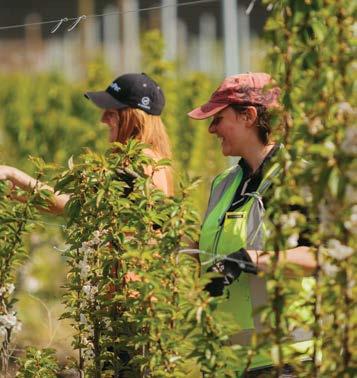
Forest Lodge Orchard prides itself on the great team of workers striving to achieve climate excellence Forest Lodge Orchard owner, Mike Casey (left) and orchard manager, Euan White
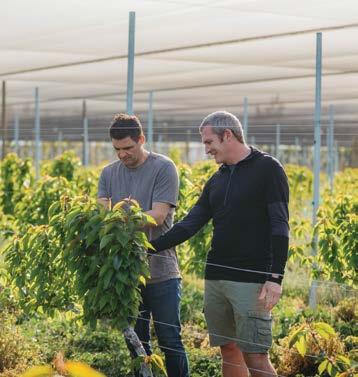
During his presentation at the New Zealand Agricultural Show, Mike provided itemised data showing the payback periods and the amount of carbon saved for the full electrification of his orchard, including upgrades for connecting to the grid and the purchase of frost fighting fans, tractor conversion and equipment, an electric sprayer and an electric vehicle.
“For the full electrification of everything on farm there is an incremental payback of seven years and a full payback period of 13 years,” Mike says. The orchard harvested its first crop of fossil-fuel-free cherries last year and Mike says the key to improving the payback of electrification and solar energy is marketing a premium product which consumers are willing to pay more for and backing this up with hard evidence. To help other growers with this, Mike has created a new certification programme, co-developed with and independently audited by AsureQuality, New Zealand’s leading food assurance provider. This certification has strict rules around fossil fuels which means that food producers must provide evidence of elimination of fossil fuels from their operations, instead of relying on offsets. “This is a vital part of providing consumers with an authentic certification because the words ‘carbon neutral’ do not necessary mean that the consumers are getting a sustainable product,” Mike says. One of the key barriers to Mike setting up a fully electric operation was finding an insurance product that would cover the risk of power cuts to his electric frost fighting fans during the vulnerable spring growing months when young cherries must be protected from the hard Central Otago frosts. To be completely fossil-fuel free, Mike wanted to avoid using a diesel-powered backup generator, struggled to find an insurance provider that would protect his business against the risk to his crops posed by power cuts – until he started working with GSI Insurance Partners Christchurch director Sean Lysaght and Vero to create an innovative insurance policy that met his unique needs. “When you are determined to create real change and do it on a large scale you need to remove the blocks that might stop others from following you,” Mike says.
When Sean started working with Mike to create an insurance product to fit the unique circumstances, he needed to find an insurance underwriter who would be willing to think creatively about the situation.
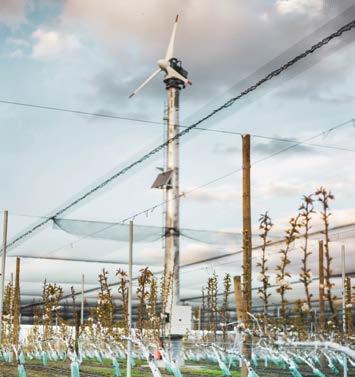
Everything from irrigation, frost fighting fans, vehicles and tools are powered through the grid and the orchard’s own power supply Inspecting the cherries
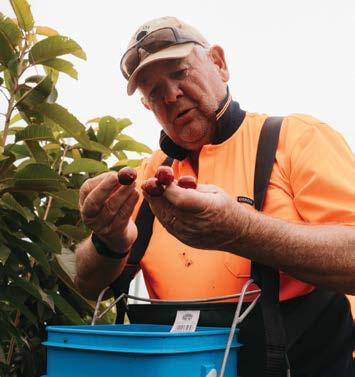
“We approached Vero and they were willing to collaborate with us to create a new and innovative insurance policy that would cover Mike for any loss of product due to power cuts,” Sean says. After spending around 18 months finetuning the insurance policy which used interruption cover as a base, Sean and Vero created a solution that fits Mike’s unique situation. Sean believes more growers and farmers will be seeking tailored insurance solutions in the future as they move towards implementing sustainable farming to mitigate environmental issues.
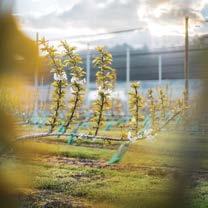
More than 1000 growers have already visited Mike’s cherry orchard. He intends to continue allowing visitors in order to encourage others to make similar changes on their farm or orchard.
“I am always keen to share what I have done with others. If we can plant a seed of change then the climate will thank us later.”
